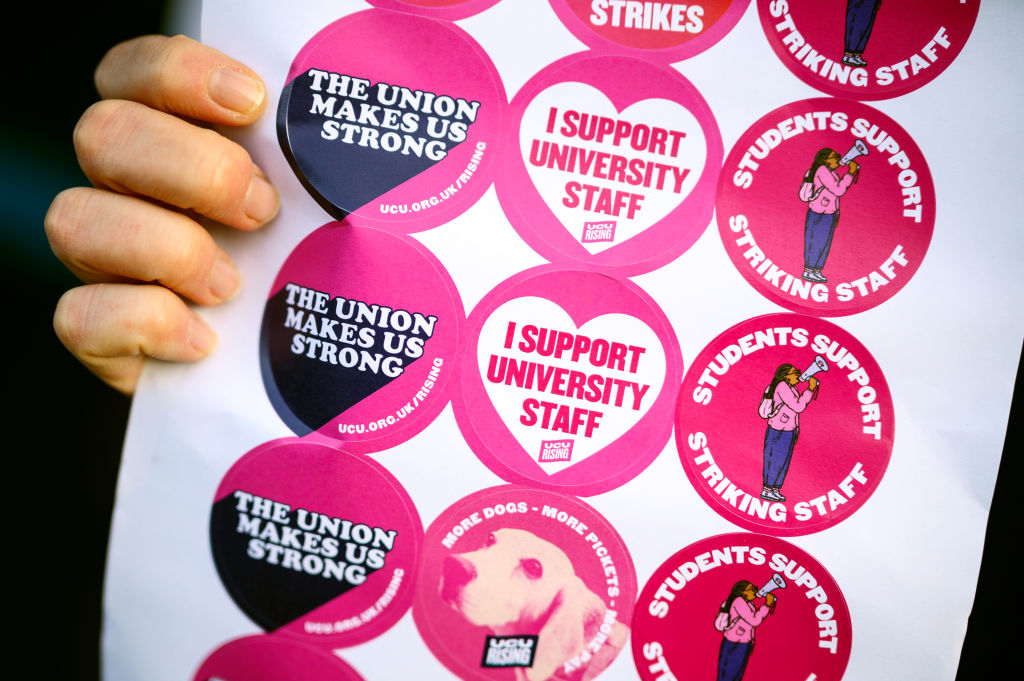Life is not terribly good these days for most university teachers. Colleges, once centres of collegiate administration run on a principle of de facto equality and open expression of opinion, are now top-down managed by a cadre of bosses more interested in spreadsheets than seminars, and image more than erudition, where an injudicious word can cause serious trouble. To add insult to injury, jobs at the lower end, previously fairly safe, are now precarious and pretty wretchedly paid.
You might have thought the lecturers’ union UCU would be an effective counterweight to all this, especially since universities are to all intents and purposes public sector employers, with union representation correspondingly high, at something over 120,000. Unfortunately you would be disappointed. True, UCU is formally demanding big pay rises and more job security, and backing its demands up with widespread, though not very productive, strike action. But its support for academics’ rights is at times curiously limited. Furthermore, it is diluting its efforts, not to mention its support, by all sorts of other posturing.
UCU has been gently taken over by activists more interested in revolution than rational thought, and frankly at times rather obtuse
Recall, for example, the saga of Kathleen Stock, the philosophy professor who resigned from Sussex in 2021 following threatening student demonstrations and demands that she be prevented from expressing her opinion on trans issues, which the administration did little to counteract. What was UCU’s response to the affair, as an organisation set up to defend academics? The Sussex branch urged her employers to ‘take a clear and strong stance against transphobia at Sussex’, a statement later endorsed by UCU nationally. More recently, Edinburgh UCU has published, presumably approvingly, a letter urging the Provost to row back on a free speech protection project in the institution, arguing that it was a threat to academics’ ‘intellectual and personal safety’ and was apt to encourage a ‘rise of colonial nostalgia’. Nor is this new: Selina Todd, the excellent left-wing Oxford history professor who had at one time to lecture with physical protection against student violence because of her views on the trans issue, curtly tweeted three years ago that she had long left UCU ‘over their terrible attitude to women’s rights.’ With friends like that in the union world, which academic needs enemies?
UCU also makes up for its pusillanimity in supporting academics with views it does not like with a keen embrace of matters most people would think were pretty peripheral to its job of safeguarding its members’ interests. It has, for example, long had an obsession with Israel: at its conference last week, it yet again passed overwhelmingly a motion to boycott Israeli academics and ‘authorise all appropriate action to protect students and staff who find themselves under attack for supporting the cause of the Palestinian people.’ So too with environmentalism: in August last year it voted for the shutting down of university careers advice about careers with companies in the mining and fossil fuel industries.
Most recently, and controversially, last Friday it poked an incredibly clumsy finger into the Ukraine pie. To the understandable disgust of large numbers of its ordinary members, a majority of its annual congress supported a motion, backed by members of Stop the War and other fringe factions, which called for an end to the arming of Ukraine on the basis that this was merely a fight between US and Russian imperialism.
One thing is clear: UCU has been gently taken over by activists more interested in revolution than rational thought, and frankly at times rather obtuse. (The unnamed person filmed speaking in support of the Ukraine motion in a clip later uploaded to social media was decidedly more Citizen Smith than Professor Calculus, something that might worry parents concerned at who is teaching their offspring.)
Why this has happened is anyone’s guess. A plausible reason, though, is that while most academics are opinionated, and a great many excellent and respectable ones on principle back UCU’s efforts to improve their position, as a trade union UCU is pretty ineffective and the only people prepared to give up the time to address its interminable meetings are the blindly committed or the slightly dotty.
What next? The Ukrainian debacle has undoubtedly touched a raw nerve, and a fair number of moderately leftish academics fed up with the latest UCU antics may well resign from it. They are probably right: however much some voices urge them to stay and fight for change from the inside, one suspects the union is now beyond redemption.
Unfortunately sidelining UCU is not likely to be easy. A point often forgotten is that its continued existence as the representative of university staff actually suits university management rather well. It is not a very effective organisation, and does not seriously threaten university structures or the bureaucratic machines that run them; indeed, in practice many of its branch representatives fit in very neatly and happily as useful cogs in those very machines.
And, of course, it is worth remembering that extreme political views such as those expressed by UCU are by no means limited to the union side. They equally affect management itself, whether in individual institutions or in umbrella organisations like Advance HE. Academic top brass accepts without much question, and indeed often embraces with reverential wonder, nostrums such as the need to decolonise curriculums, the idea that British society and institutions are structurally racist, and the necessity for universities to tear down privilege and empower the oppressed.
Ideally we would see a new union, rather on the lines of the Union of Democratic Mineworkers set up in 1985 as an alternative to Arthur Scargill’s NUM, to deal with this ungodly exercise in mutual back-scratching. It may be difficult, but if enough people are prepared to point out the UCU emperor’s decided shortage of clothes and walk away it is not impossible. Here’s to hoping, at least.






Comments